 |
| The 9/11 attacks that targeted innocent people were denounced by Muslims, like the rest of the world. |
The 9/11 attacks on the World Trade Center and the Pentagon marked a turning point and the beginning of a new world order. Some experts predicted that this attack would lead to greater conflict and violence, while a majority of voices pointed out that America's response and future policies must be measured and just.
In the aftermath of the attacks, America began a large-scale offensive against terrorism. Most countries and international organizations supported this effort, which, in essence, is a military operation directed against terrorism and all organs that support it. At present, despite some partial successes, this war has not met its objectives or achieved a conclusive victory.
One of the primary reasons for this failure is that the American strategy is based mainly on military operations to the exclusion of any educational or cultural measures. Military measures, such as removing regimes that support terrorism, cannot defeat terrorism, for terrorism is a socio-psychological and ideological problem. Such a military-only strategy creates tragedies in which countless innocent people lose their lives, as well as the radicalism that, in turn, becomes yet another factor feeding terrorism. Only an intellectual war can effectively diffuse the terrorists' propaganda and eradicate terrorism. Military operations should be used only when appropriate.
For this reason, the war on terrorism must be conducted within the rules of international law and by the use of peaceful but effective measures. Every activity that ignores the law and human rights, especially when it is causing civilian deaths, will cast a shadow over this war, even if it began as a just cause. It is important for the American leadership to remember such facts when determining its strategy, for it is the ideology of terrorism that must be destroyed. The so-called "Islamic terrorism" thought to be behind 9/11 feeds off radical groups that seek to use Islam as a so-called justification for their quest for violence.
 |
When the ideological structure of or education undergone by these groups are examined, one immediately sees that they possess a Darwinist mindset. There is therefore no significance to the way these groups claim to act supposedly in the name of Islam, because they actually have Darwinist mindsets. What is needed before all else is a powerful intellectual campaign against Darwinism and for people to be taught true religious moral values and the love, affection and compassion that lie at the heart of the Qur'an.
It is mainly the Muslims themselves who should replace these mistaken views with the correct understanding of Islamic principles and prevent those who misunderstand Islam from acting upon their rage. Thus, American policy should support a solution from within the Islamic world. As we have stated all along, forming the Turkish Islamic Union is the only realistic solution.
It is in America's best interest to adopt this approach, not to mention within the best interest of the Islamic world and the world in general. Those who think otherwise should reconsider, as they might well be dragging the world into a bloodbath. The American leadership also must be careful not to be distracted by such misrepresentations that lead them to identify Islam as a hostile religion and culture. The people behind such distortions are strategists and ideologues who wish to see a bloody war between the West and the Islamic world. They are doing their best to present American anti-terrorism policies as a war on Islam. Some commonsense announcements by the American leadership, which rejects the idea of a war between the West and Islam, have had positive effects; however, they need to be seen by the global community as affecting American policies.
 |
| Paul Wolfowitz, the former American Deputy Secretary of Defense, was one of the theoreticians of the "Bush Doctrine" developed after 9/11. |
In the aftermath of 9/11, the Bush administration announced a new national security and foreign policy strategy. One week after the terrorist attacks, President Bush revealed the framework of this strategy in his speech to the nation. Known as the "Bush Doctrine," it proclaimed, in effect, that America would engage in preemptive strikes in order to defend itself. While such attacks may sometimes be justifiable, in actuality it meant the beginning of a new era. This strategy was hammered out under the prevailing psychology in the immediate aftermath of the attacks, drawing heavily on President Bush's patriotic feelings. Some hawkish circles in the country promptly suggested that this new strategy should target almost all of the Middle East and that the nation must be prepared to stomach a 20-year war in the region. Less provocative circles pointed out such an approach's inherent flaws and asserted that it risked escalating terrorism. Before examining the potential risks, it is necessary to clarify the meaning of "preemptive attack."
America, the world's only superpower, quite naturally should have political interest, as well as a strategy, in different parts of the world. Besides, American military intervention has had some positive results. For instance, in the 1990s, American diplomatic and military intervention targeting Serbia, which first attacked first Bosnia-Herzegovina then Kosovo, played an important role in stopping Serbian aggression. The important question here is whether or not such American policies are compatible with international law, and whether they are just and conciliatory, in compliance with human rights, and fairly protect the rights of each group.
In international relations, precautionary defensive measures by individual countries are usually received with a degree of compassion. Of course, every country wants to defend its existence and future, and therefore develops strategies for this purpose. However, this defensive approach should not allow unjustifiable intervention into other nations' affairs. The most successful and safest strategy for a country to adopt is one that seeks to preserve peace and happiness. Peaceful strategies lead people to prosperity and security, and every attempt to disrupt the peace and prevailing order is very dangerous.
 |
| American intervention in Bosnia-Herzegovina and Kosova played a major role in restraining Serbian violence. |
Within the American leadership, those who advocate preemptive attacks are proposing a very risky strategy that far exceeds any country's legitimate rights of self-defense. According to this flawed mentality, which is trying to prepare the ground for all kinds of attacks, the assertion that "they might become a threat in future" is the perfect excuse. However, turning to military means alone to resolve disputes cannot succeed, as history has shown over and over again.
According to this flawed logic, international relations depend not upon law, but upon power. These people would like to see America show off its power and clearly demonstrate to its opponents that the nation is still going strong. The hawks believe, mistakenly, that America can maintain its superior military might only through war, and that therefore it must always be the one to strike first. However, not all members of the American administration share this dangerous attitude. From time to time, the hawks gain the upper hand in American politics. However, many bureaucrats as well as advisors advocate a measured and peaceful policy.
All countries, especially America, must strive for peace and protect and support it at all cost. Circles that push the ideas that "might is right" or "the use of force will solve the problems in direct proportion to its use" are, in reality, driving their country into a dead-end situation. One aspect of this is the risk of escalating terrorism. Many strategists point out that America has begun to lose its economic as well as political power. American military might may well have its advantages, but the ongoing threat of war, as well as the continuous state of alarm and readiness for war trumpeted by the hawks, will deal a serious blow to its economy.
 |
| The twentieth century was full of wars that killed millions of people and caused heavy material losses. In this new century, humanity must seek peaceful solutions to all such problems. |
Furthermore, if this country is always at war somewhere in the world, people will no longer perceive it as the guardian of human rights, democracy, and freedom. As a consequence of its hawkish policies, America will become a nation feared by, instead of respected by, the world community. Even if some military objectives are achieved, America will suffer economically and damage its international image. So, it would only be a very limited success for the country. In reality, the American government also does not want to end up in such a situation, and so it must be cautious and measured when taking the hawks' flawed views into account and do its best to follow rational policies.
Moreover, these circles should consider the example they are setting for other nations and calculate the potential costs of other countries behaving in the same way to protect their interests. It is fairly obvious what kind of disorder and conflict the world would experience were such nuclear-armed countries as Russia, China, India, or Israel to adopt the strategy of preemptive attack. Even just the possibility of such a scenario represents a great threat.
Clearly, America has the right to protect its national interests and defend itself against potential threats. The international community respects this, especially after the 9/11 tragedy. This right, however, can be used to benefit America and the world at large if its use complies with international law. The most important mechanisms for preventing this strategy from descending to the level of a personal war are international law and the broad consensus of the international community reached within its framework. If these mechanisms are ignored, the proponents of this strategy will lead America into a crisis and will represent a threat to world peace.
 |
| The fact that war is not a solution has been expressed many times by American citizens and civil society, such as the American National Council of Churches. Many religious leaders have stated that pious Americans are in favor of peace. 1. United for Peace and Justice is an NGO that uses the Internet to call for peace. 2. Veterans against the Iraq war is another NGO that carries out an anti-war campaign. |
America must reconsider its strategy in the light of all the above concerns. The way to world peace and stability cannot be aggression and violence, but common sense, fairness, and caution. The primary strategy for its war against terrorism must be to support cultural activities. In order to defeat every ideology that considers violence to be a solution, human relationships a source of personal gain, and aggression legitimate, the conditions that give rise to terrorism must be fought. The widespread acceptance of religious morality, which demands conscience, love, and compassion instead of evil incited by anti-religious ideologies, will provide lasting solutions to terrorism and many other social ills.
Appropriate cultural programs can be implemented by American cooperation with non-governmental organizations, many of which are currently working on such issues. This is an encouraging sign, no doubt, but lasting solutions require state backing and a widening of these efforts' scope.
Besides, the American government must not forget that Christianity's central tenets oppose war and hostility. Allah forbids people to incite disorder or endanger peace and security. If America respects religious beliefs, it must become a role model for all people by seeking to bring peace and security, not fear and apprehension. Those members of the Bush administration who often perceive the need to mention their Christian faith must not forget that the Prophet Jesus (peace be upon him) commands them to be ambassadors of peace: "Blessed are the peacemakers." (Mathew 5:9).
American religious leaders have called upon the American administration in this regard. In a letter (50 signatories) to President Bush in the days before the American invasion of Iraq, the National Council of Churches (NCC) gives important messages:
We write out of concern that those same precious gifts [of Allah] may be damaged by actions being contemplated by our nation.
We, leaders of American churches and church-related organizations, are alarmed by recent statements by yourself and others in the Administration about pre-emptive military action against Iraq for the expressed purpose of toppling the regime of Saddam Hussein. Understanding that Mr. Hussein poses a threat to his neighbors and to his own people, we nevertheless believe it is wrong, as well as detrimental to U.S. interests, to take such action.
We oppose on moral grounds the United States taking further military action against Iraq now… Military action against the government of Saddam Hussein and its aftermath could result in a large number of civilians being killed or wounded, as well as increasing the suffering of multitudes of innocent people.
... As Christian religious leaders responsible for millions of U.S. citizens we expect our government to reflect the morals and values we hold dear—pursuing peace, not war; working with the community of nations, not overthrowing governments by force; respecting international law and treaties while holding in high regard all human life. 25
 |
| Not so! All who submit themselves completely to Allah and are good-doers will find their reward with their Lord. They will feel no fear and will know no sorrow. (Surat al-Baqara: 112) Each person faces a particular direction so race each other to the good. Wherever you are, Allah will bring you all together. Truly Allah has power over all things. (Surat al-Baqara: 148) |
War is an evil that always brings pain and tears to the warring parties and causes terrible losses. Religious morality requires that people resolve their disputes peacefully and in a conciliatory manner. Those who live according to religious morality refrain from such harmful attitudes as hate, revenge, and anger. Instead, they adopt a compassionate and forgiving stance. When people are distanced from religious morality, an environment conducive to internal and mutual communal conflict develops. Accordingly, the two world wars were evils brought about by irreligious ideologies. The First World War caused devastation from Europe to the Middle East and killed more than 10 million people, while the Second World War, which, like the first, had no valid justification, ended in horrific bloodshed costing 55 million deaths. The survivors witnessed levels of cruelty rarely seen in history, and millions of innocent people perished in concentration camps.
Darwinism is The Root of Terrorism |
| Darwinism's encouragement of conflict, barbarity and war is in fact far more serious in scale than what is superficially touched on above. It is evident that Darwinist philosophy has brought humanity nothing but blood, suffering and tears. People educated in the Darwinist mindset have been brainwashed with ruthless ideas to treat one another as if they were animals and even regard killing one another as perfectly normal. Ideologies that favor violence and inflicted terrible disasters on mankind in the 20th century supported, on the basis of Darwinism, "conflict or war against those who are not of us" and even adopted this as their most important operational technique. Horrifying acts of terror in the present day show how particularly influential the false idea of "man as a fighting animal," which is inculcated by Darwinism in people's subconscious minds, is. What supposedly justifies terror and violence for these people is such dangerous slogans, based on Darwinism, as "only the strong survive," "big fish eat little fish," "war is a virtue" and "man advances by waging war." Actually, once Darwinism is done away with there will be no more philosophies of "conflict." The three Divine religions that most people in the world believe in, Islam, Christianity and Judaism, all oppose violence. As we shall be seeing in the sections that follow, all three religions wish to bring peace and harmony to the world, and oppose innocent people being killed and suffering cruelty and torture. Conflict and violence violate the morality that Allah has set out for man, and are abnormal and unwanted concepts. However, Darwinism sees and portrays conflict and violence as natural, justified and correct concepts that have to exist. For this reason, the root of the terrorism that plagues our planet is not any of the Divine religions, but in irreligion, and its expression in our times: "Darwinism" and "materialism." Since Darwinism is taught in just about all schools in almost every country in the world, as if it were a scientific fact, it is inevitable that new generations of terrorists will emerge. That is why it is a matter of the greatest urgency for young people taught that their ancestors were animals that came into being by so-called chance, that they have no responsibility toward Allah and that they can only survive by being victorious in war and conflict should be kept away from such dangerous ideas. Young people brought up in the light of such corrupt ideas can become ruthless enough to slaughter innocent children and perpetrate all kinds of actions that violate reason and good conscience. Indeed, the communist, fascist and racist terror groups that have plagued the world in the last century have all been the product of this education system. In conclusion, the solution lies in a powerful cultural campaign against Darwinism, the true root of terrorism, and teaching young people fear of Allah and to behave rationally and virtuously. The result will be societies that produce people full of peace, feeling of safety, forgiveness and compassion, as Allah reveals in the Qur'an. |
However, these two world wars and the resulting devastation still have not convinced many people just how terrible a disaster war actually is. The Second World War did not end conflict and war; instead, new ones broke out all over the world, killing continued, and the political ambitions of the few killed millions of people, crippled untold thousands, destroyed entire cities, and devastated whole nations. Wars have also caused serious psychological damage to the survivors and damaged the spiritual well-being of an entire generation. Wars produced people who experience anxiety attacks, shake uncontrollably, and suffer from sheer fear just by hearing the word "bomb" or seeing a uniform. Some of them have remained schizophrenics for years because of the terror they have witnessed, and others have failed to readapt to society.
Those who believe that war can solve problems only have faith in military solutions. Those who plan new wars, particularly in the Middle East, must remember previous human tragedies and abandon their dangerous plans. The cost of invading Iraq reveals another dimension to such affairs.
 |
| The two world wars caused great destruction and killed millions of people. Humanity needed a long period of time to heal their wounds. |
| Do not corrupt the earth after it has been put right... (Surat al-A'raf: 56) |
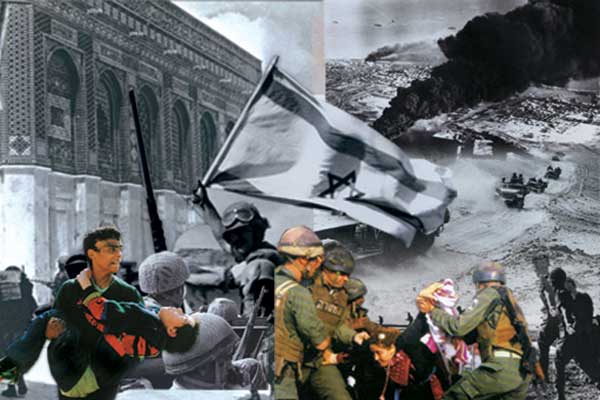 |
| Not a trace will remain of these painful sights once Darwinism has been intellectually eradicated and the Turkish-Islamic Union has been built. The warmth, affection, compassion and love brought with them by the moral values of the Qur'an will enfold all people, and all will, no matter what their faiths or beliefs, live together as brothers. |
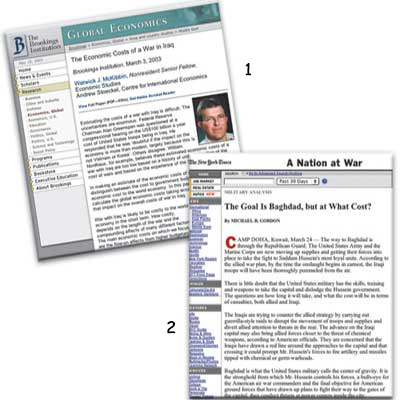 |
| The cost of invading Iraq became a major topic of discussion before and after the war. |
Many statistical studies conducted in America about the costs of invading Iraq reveal that besides the direct costs, there are serious other implications that need to be considered. For instance, the study by Senator Joseph Biden, chairman of the U.S. Foreign Relations Committee, puts this cost at $100 billion. Biden also stated that another $50 billion would be needed to rebuild Iraq, and that the total cost would be more like $150 billion. At present, it appears that the invasion was successful and that everything has been contained within the estimated limits. However, this will not cause the tragedies experienced during the war to be forgotten and does not justify using these resources for this war instead of the American people's prosperity.
The $100 billion cost is not considered a significant amount by the hawks. However, it is three times the education budget for children aged between 0 and 12, four times the country's foreign relations budget, and able to cover the health costs of all American children without health insurance for 5 years. This is indeed a thought-provoking fact: That this amount of money is spent on an invasion that costs the lives of thousands of people instead of used to increase the living standards of all Americans. However, given that these estimated costs have been calculated based on ideal conditions, many retired military and defense experts say that the costs will spiral, considering the potential risks of the post-invasion period.
Past American wars have shown that the costs of these wars far exceeded the planned amount. For instance, the Secretary of the Treasury in Lincoln's cabinet estimated the cost of the Civil War for the North would be $240 million; in fact, the actual cost was 13 times higher ($3.2 billion). In the 1966 budget, $10 billion was earmarked for the war in Vietnam, which was expected to end in the summer of 1967. But the war continued until 1973, at a direct cost of between $110 and $150 billion.26 In addition, 47,000 American soldiers died on the frontline, another 11,000 soldiers died in various circumstances, and a total of 303,000 soldiers were injured. More than 1 million Vietnamese civilians lost their lives, 225,000 Vietnamese soldiers were killed in the war, and 570,000 were injured.27
 |
| The Turkish Islamic Union will be a giant step toward world peace. Thanks to this unity, various problems will be resolved peacefully, justly and quickly. |
These examples reveal that the cost of warfare can spiral out of control when things do not go according to plan. Therefore, all future wars and invasions must be prevented, for the human and financial losses on both sides can increase dramatically. Moreover, a democratic, peaceful, and moderate order cannot be created in the Middle East by means of war, as the American administration is intent on doing. Even if military success is achieved, it is next to impossible to create a lasting peace and order in this way. Winning a war on the battlefield is not necessarily enough to control and rule a region politically. And, what usually happens after any invasion is a very good proof of this.
 |
The Middle East rests on precarious balances. History proves that it is highly unlikely that foreign powers will maintain these balances justly or fairly, or achieve an order that is acceptable to the region's very diverse population. Only a power that shares the region's culture and civilizational ethos can do this. This must be a central authority that unites all Muslim nations, one that reflects and represents their will.
This authority is the Turkish Islamic Union, which will not only resolve the problems in the Middle East, but also all problems between the West and the Islamic world. Therefore, the West, especially America, must support the formation of the Turkish Islamic Union, which will unite all Muslim nations under a peace-seeking, compassionate, and constructive umbrella and cooperate with it. In this way, America will find a reliable political union with which to maintain dialogue and cooperation, a union stretching from Morocco to Indonesia.
Many American strategists and thinkers have pointed out this fact, and William Nordhaus, a renowned economist and professor at Yale University, states in the "conclusions and suggestions" section of his report, titled: "The Economic Consequences of a War with Iraq," the following:
From a political point of view, unilateral actions, particularly those taken without support from the Islamic world, risk inflaming moderates, emboldening radicals … in those countries. 28
It is an interesting question to ask why America invaded Iraq despite the clearly visible damage and negative impact that such an act would engender. Many strategists think that this invasion had been planned well before 9/11, and suspicions concerning the American administration's claim that Iraq had, and possibly intended to use, weapons of mass destruction began to be heard.
This military action is part of America's new Middle East strategy. Those who developed this strategy had decided already in 1997 that America had to hit Saddam and remove him from power. The first signs of this emerged in 1997, when a group of strategists in Washington, under the influence of the Israeli lobby, formed the Project for the New American Century (PNAC) think-tank to advocate for occupying Iraq. The foremost names of PNAC, later to become the most influential people in the George W. Bush administration, were Defense Secretary Donald Rumsfeld and Vice President Dick Cheney. Even if they had originally set out to create a stable world order under American leadership, they acquired the belief, assisted by the Israeli lobby, that a war in the Middle East was necessary. Had they made a comprehensive evaluation, they soon would have realized that such a belief was mistaken. If the purpose was to create stability, it is obvious that war never brings about stability and order. To the contrary, it destroys the existing order and brings about nothing but loss. It is a historic fact that stability can be achieved only by preserving peace.
American Casualties From Major Wars |
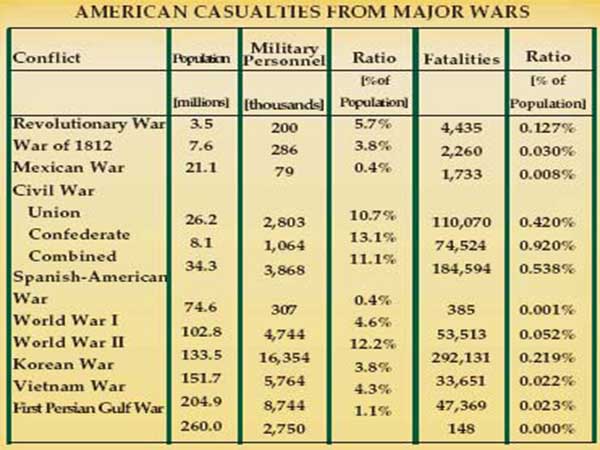 |
American Cost of Major Wars |
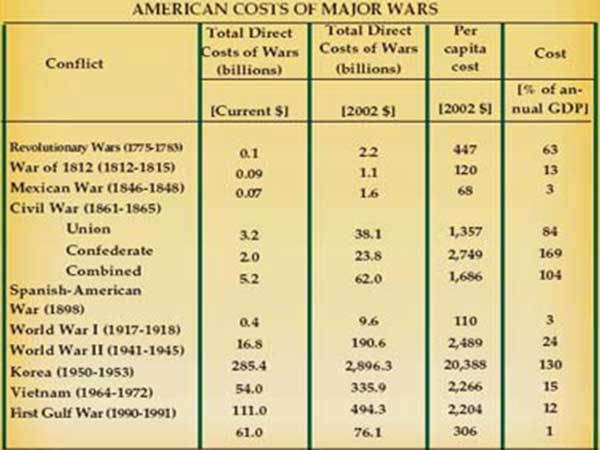 |
| The tables above reveal the losses inflicted on America by the great wars in which she participated. |
An article titled "Invading Iraq Not A New Idea For Bush Clique: 4 Years Before 9/11, Plan Was Set," published in the Philadelphia Daily News under the name William Bunch, stated the following:
But in reality, Rumsfeld, Vice President Dick Cheney, and a small band of conservative ideologues had begun making the case for an American invasion of Iraq as early as 1997— nearly four years before the Sept. 11 attacks and three years before President Bush took office.
An obscure, ominous-sounding right-wing policy group called Project for the New American Century, or PNAC—affiliated with Cheney, Rumsfeld, Rumsfeld's top deputy Paul Wolfowitz and Bush's brother Jeb—even urged then-President Clinton to invade Iraq back in January 1998.
"We urge you to ... enunciate a new strategy that would secure the interests of the U.S. and our friends and allies around the world," stated the letter to Clinton, signed by Rumsfeld, Wolfowitz, and others. "That strategy should aim, above all, at the removal of Saddam Hussein's regime from power. 29
But what was the reason for PNAC's members to be so persistent about bringing down Saddam? The same article continues:
While oil is a backdrop to PNAC's policy pronouncements on Iraq, it doesn't seem to be the driving force. [Ian] Lustick, [a University of Pennsylvania political science professor and Middle East expert], while a critic of the Bush policy, says oil is viewed by the war's proponents primarily as a way to pay for the costly military operation.
"I'm from Texas, and every oil man that I know is against military action in Iraq," said PNAC's Schmitt. "The oil market doesn't need disruption."
Lustick believes that a more powerful hidden motivator [for war] may be Israel. He said Bush administration hawks believe that a show of force in Iraq would somehow convince Palestinians to accept a peace plan on terms favorable to Israel. 30
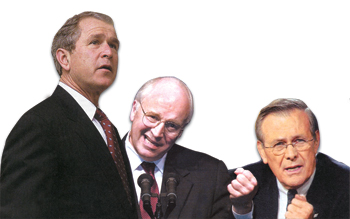 |
In short, the real architects behind the invasion are Israel and its American allies. At this stage, it once again becomes apparent that America's Middle East policy is heavily influenced by Israel. Some radical zionists acting in Israel's interest exercise great influence over America's decision-making mechanisms and convince Washington to act according to Israel's Middle East strategy. Moreover, they do so while claiming that American and Israeli interests are identical, despite the fact that American interests in the Middle East are not compatible with supporting radical zionists in Israel. Just by doing so, the US manages to affront the entire Arab world. Its interests would be better served by persuading Israel to moderate its policies and make peace with the Arabs, with itself serving as a just mediator.
This same Israeli influence can be seen in the planning stage of the invasion. The Israeli lobby misdirected the strategists who would come to hold influential positions in the Bush administration so that they would see the "need" to invade Iraq. However, this has caused new tensions in the region and gradually opened the way for a military action that caused the death of many innocent Iraqi civilians.
Irrespective of how much these strategists talk about American interests, in reality they are defending Israel's interests, because it is not in America's interest to fight with the entire Middle East and to offend and alienate its people. America does not have an anti-Islamic ideology and strategy, as some circles claim. As we stated before, America was one of the greatest allies of the Balkan (e.g., Bosnian, Kosovan, and Macedonian) Muslims who were exposed, during the 1990s, to Serbian atrocities. The only American "frontline" that negatively affects the Muslim masses is in the Middle East, due to certain officials who, under the influence of the incredibly powerful Israeli lobby, take a pro-Israeli stand in foreign policy. Once these officials are freed from such manipulation and thus enabled to assess the Middle East without bias, fairer policies will be developed.
 |
| Although oil seems to be the real reason for the war against Iraq, researchers say that very different reasons lie behind the scenes. |
This is the reason behind the American strategy of rearranging the Middle East, which the American administration enacted after 9/11. Israeli radicals, playing upon Israel's long-standing fear of annihilation, have long sought to rearrange the Middle East to make it a more controllable and safer region for Israel. With this goal in mind, they have exerted their influence over America and manipulated its Middle East policy for decades.
In reality, it is not in Israel's interest to be in conflict with the Islamic world either. Jews, Christians, and Muslims have the right to worship as they wish in these lands, but the policies of atheistic zionists influential in Israel oppress Muslims and worries Christians and Jews. It would be far better for the Israelis, as well as for all Middle Easterners, if Israel withdrew from the Occupied Territories and made true peace instead of being in a constant state of war with the entire Middle East. Therefore it is necessary, also for the safety of the 4.5 million Jewish citizens, to intellectually fight the atheistic zionist philosophy that seeks to perpetrate war in the Middle East as well as to incite a clash of civilizations.
Atheistic zionism, a racist, chauvinistic, and oppressive ideology, aims to force non-Jewish residents from Palestine or even to kill them. It also intensely oppresses devout Jewish people. However, the ongoing lack of knowledge and misinformation combine to prevent both Jews and Christians from realizing the truth about atheistic zionism. It is the responsibility of every person working for world peace to show radical views' danger to humanity at large. Genuinely religious Jews, along with conscientious Christians and Muslims, must unite to invite everyone to the righteous path. When people come to realize the truth about the fascist, social Darwinist, and oppressive ideology known as atheistic and radical zionism, this large obstacle to world peace will be removed, and people who now advocate violence will become defenders of peace.
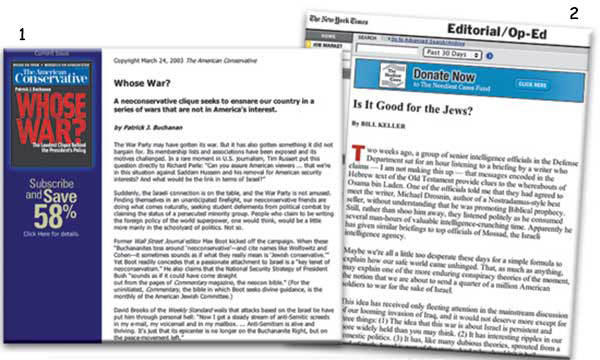 |
| The relation of the pro-war group to Israel caused serious arguments in America. Patrick Buchanan's article, "Whose War?" deals with information that appeared in the media about this subject. "Is It Good for Jews?" an article that appeared in the New York Times, discusses the benefits Israel will get from the invasion of Iraq. The two articles in the National Review called attention to the error of presenting all Jews as being pro-war. |
The Turkish-Islamic Union will be the salvation, not just of Palestine, which has suffered terribly for more than half a century, but also of Israel. Israel has effectively imprisoned itself behind giant walls, but will escape the predicament into which it has fallen by way of the justice, peacefulness and loving nature of the Turkish-Islamic Union, and peace and security will come to the whole region. These lands played host to friendship and brotherhood for 400 years under Ottoman rule. Jews, Christians and Muslims lived together in brotherhood, worshiped as they pleased, settled where they wished, engaged in trade freely and lived in complete security. The only means whereby this beauty of the past can be brought back to life, in an even better form, is with the foundation of the Turkish-Islamic Union.
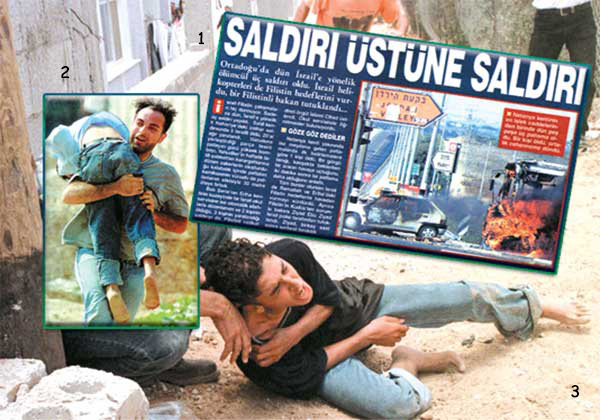 |
| Palestine must be a land where Jews, Christians and Muslims can live together in peace. It is possible to re-establish the security that once prevailed in Palestine under Muslim rule. |
An Interview with Mr. Adnan Oktar by Tasca |
| Adnan Oktar: The Turkish-Islamic Union is an international one. But let us refer to it as "among brothers," a work among brothers. Of course we are trying to contact all the Turkic states. We are trying to reach all Islamic countries, but Christians and Jews are also entrusted to us by Allah. I feel a great affection for them, and a powerful love and urge to protect them. That is why I particularly want to see Armenia in the Turkish-Islamic Union. I particularly want Israel to be in it. I want them to see the love, concern, interest, support and help they will be given, how free they will be, and the friendly and loving manner they will be treated. Look at how the Jews have been devoted to the Prophet Moses (pbuh) for thousands of years. That is an excellent thing. Christians have been loyal to the Prophet Jesus (pbuh) for 2000 years. And that is excellent, too. But they are unaware. We are living in times resembling the period between the Prophet Jesus (pbuh) and the Prophet Muhammad (may Allah bless him and grant him peace). They may not have realized. They may not have understood the Qur'an. There are people who are inciting them against the Qur'an. But the more they have learned the more they have begun to realize. They have begun realizing the invalidity of belief in the Trinity, for example. The Jews, for instance, have better begun realizing the importance of belief in the Hereafter. It was in the Torah, but they took it out. But belief in the Hereafter can still be seen in the Torah. They have begun strengthening it under the influence of the Qur'an. The more these people are told about Islam and the Qur'an, at least they correct their polytheistic and false beliefs. That is a great success, a blessing and a beauty. In one verse Almighty Allah tells us to unite under a common word, the oneness of Allah. We are calling on people to do that, and they are our brothers. Theirs are old forms of Islam. They have been corrupted, but they are still old forms of Islam, and they are the People of the Book. For that reason, they are just as deserving of love, respect and protection as Muslims. They will therefore enjoy peace and security. |
Ever since the beginning of the Iraqi crisis, religious leaders from all over the world have made genuine efforts for peace. One such effort was made by Rabbi Waskow, a leader of the peace organization Shalom, which calls upon people to fast for peace. Many religious leaders of various denominations joined in and once more demonstrated that Judaism, Christianity, and Islam are all anti-war:
We call upon Americans to fast:
To reflect, to seek a truer peace, to pray
In the name of the God of compassion, Who commands us to seek peace and justice…
God calls on us all to seek peace and pursue it.
Yet with deep concern we see the danger that neither the government of Iraq nor the government of the United States is taking this calling as its primary goal…
God calls us to love our neighbors as ourselves, to love the stranger and the foreigner, to do nothing to others that would be hateful to ourselves…
God calls us to feed the hungry, house the homeless, clothe the naked, heal the earth, free the mind and spirit…
God calls us to reflect—to think, to feel, and to pray before we act.
Yet we see that with no evidence of any imminent and urgent danger, our government is rushing into a war that threatens to bring death to many families—"our own" as well as those who live in another country. A war that may engulf in rage and destruction an entire region of the world, one that all our traditions hold especially dear…
At this moment of great danger, we turn toward God…31
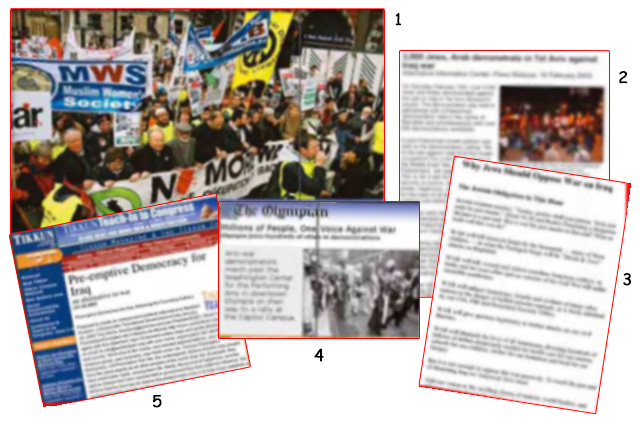 |
| Both in Israel and America, many Jews advocate peaceful coexistence with Muslims and that both sides make sacrifices in order to establish this peace. Jews who advocate peace severely criticize the Israeli policy of violence against the Palestinians as well as the Iraqi war. In its website, Tikkun, a Jewish organization in America, reveals the blunders of pre-emptive military action. News about the anti-war demonstrations in Tel-Aviv in which both Jews and Arabs participated (above left). An article by Rabbi Arthur Waskow, "Why Jews Should Oppose War on Iraq," stresses that Judaism is against all kinds of violence and belligerence. |
 |
| 1. This advertisement, prepared by the Shalom group, explains why sincerely religious Jews have to oppose war. |
 |
| Saddam Hussein was one of the many Arabs misled by the "Arab socialism" that pervaded the Arab world in 1960s. |
From the first day of the Iraqi invasion, the stated main goal was to remove Saddam's regime. Such a strategy, irrespective of the offered justifications, cannot be implemented successfully by military means. The lives lost during the invasion prove that this choice was wrong and that it should have never been made. However, it is also clear that Saddam was a dictator who was damaging to the region and whose regime needed to be removed.
Saddam Hussein was just one of many people who, in the 1960s, were led astray by Arab socialism, which was sweeping through the Arab world at that time. Arab socialism fused extreme fascism with a fanatic third world leftist agenda supported by the Soviets. Stalinism, the Soviet version of communism, stamped its mark upon the worldview of Arab socialists, who developed aggressive, oppressive, and provocative policies. Saddam was a leading Ba'th Party militant, the embodiment of this erroneous ideology in Iraq. In his youth, he organized and carried out attacks on political organizations and individuals opposed to the Ba'th movement through the Jihaz Hanin (the Apparatus of Yearnings) terrorist organization. Following the Ba'thists' first coup d'etat, an interrogation unit was formed under Saddam's command and subjected its sufferers to horrific torture. It was known that Saddam even devised new torture techniques.
Under the influence of the Stalinist ideology in which he fervently believed, he became a ruthless and merciless dictator known for his cruelty. In 1980, he ignited a bloody 8-year war by invading Iran; 2 years after that tragedy ended, he invaded Kuwait. He was violent with all domestic groups and individuals that he considered potential threats, as his chemical weapons attack on the Kurdish village of Halabja (northern Iraq) proved: 5,000 innocent people died. And, this was just one of his regime's crimes against humanity.
All of this clearly proves that Saddam was not fit to rule Iraq. People expect their leader to deliver peace, security, happiness, and prosperity, as well as peace and stability both to their neighbors in particular and the world in general.
Now that Saddam and his regime have been removed from power, the post-invasion strategies are crucially important. It is not enough to portray Saddam as a tyrant for a lasting peace to appear in the Middle East. What is needed is an analysis that can correct the conditions and ideologies that led him to tyranny. What made Saddam a bloody dictator was the Ba'thist ideology and the fascist culture that sought to resolve all issues with force or even bloodshed. A comprehensive education campaign and enlightened policies are needed if the Arab world is to be cleansed of this ideology and culture, both of which must make way for a civilized generation and people who are compassionate, loving, and humanitarian, as required by Islamic morality. In a society that practices this morality, such problems will not be encountered.
It must not be forgotten that this provocative ideology and culture does not just exist in Baghdad, but also is found in many other regions—often under the guise of religion. Its real solution lies in telling people of the true religious morality in an effective way.
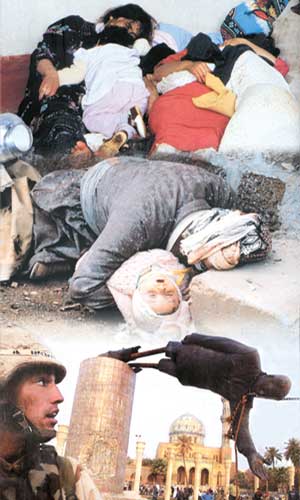 |
| The radical Ba'th ideology made Saddam adopt a cruel policy even toward his own citizens. However, in order to totally eliminate the detrimental effects of this ideology, a cultural struggle must be carried out against the ideologies in question. |
It is highly probable that the Iraqi invasion will cause wide-ranging and prolonged instability in the Middle East. It appears that circles with influence over American policy at the period when the invasion started wanted to rearrange the whole Middle East, and even the Caucasus and Southeast Asia, if necessary, by war. Some members of the then American administration expressed the view that "America could take action against '40-50 countries'," by which they divulged such plans.32 Irving Kristol, a PNAC participant, argued that "it is always a positive sign when the American people are prepared to go to war,33 which is another example of this mentality. All of this means that even those who devise these plans will probably not live long enough to see the end of this continued state of war.
This state of war, which will drag the world into pain and destruction, will rock the world order and deeply affect the people in the region and mankind as a whole. As we pointed out earlier, America and all other nations have the right to protect their national interests and to take precautions against situations endangering their security. But like all nations, America, as the only superpower, must use this right on the basis of ensuring world order and peace. The national security strategies of all countries, especially America, must comply with international law in order to prevent arbitrary actions. Also, when issues like terrorism threaten world security, multilateral cooperation and international alliances increase the probability of peace. Reducing tension and resolving conflict by supporting moderate and democratic forces, instead of trying to suppress violence with violence, must become the way forward. If we want to make the twenty-first century one in which all people's prosperity and security are guaranteed, all leaders must drop any ambition of creating a world order in which only the strong rule and have rights by means of continuous warfare.
Both America and other Western nations, as well as all Muslim nations, want potential threats to world peace to be eliminated, wish for economic stability, call for the strengthening of democratic regimes, demand an end to human rights abuses, seek to end all forms of tyranny over people's lives, and seek a better quality of life and an equal share of world's rich natural resources. Some strategists portray Muslims as the intended targets, which, in addition to affronting the entire Islamic world, is an equally dangerous and flawed strategy. People who interpret religion wrongfully are susceptible to myths and false beliefs and become extremists by moving against the grain of religion. Such people, who can be found among Muslims, Jews, and Christians, are all a great danger to world peace.
 | |
| 1. NTV MSNBC 23.04.2003 | 3. Yeni Şafak Gazetesi, 250.4.2003 |
| Some circles in the American government seek to secure stability and order in the Middle East through war. If their policies are followed, wars will follow one another and the so-called goal of establishing security will bring the entire region closer to war. However, establishing the Turkish Islamic Union will eliminate the possibility of war and thus enable a permanent order to exist. | |
Removing this danger is only possible by preventing extremism and forming an alliance of all moderate, peace-loving, civilized, and sincerely religious people. Only such an alliance can weaken the influence of those who present war as the only option and believe, erroneously, that it guarantees security. Thus, even more bloodshed, tears, and financial losses will be prevented.
In order to create this alliance, Westerners need to abandon their prejudices, come to really know and understand the Islamic world, and formulate joint policies that will help it develop. All parties can eradicate mutual misunderstandings by means of educational and cultural programs, for radicalism is the result of ignorance. While these educational projects will enable the West to understand Islam better, the myths and false beliefs anchored in the Islamic world will be done away with so that mutual compassion and understanding will take root. Hate, anger, and malevolence will be replaced by peace, compassion, and security. The resulting culture of peaceful coexistence will lead to peace between different civilizations, and cultural sympathy and interaction will deliver social progress, contrary to the claims of those who advocate a clash of civilizations.
Clearly, the Islamic world needs a culture of compassion just as much as the West. From time to time, some Muslims come under the influence of bigoted views that make them hostile to people of other religious denominations or ethnic groups, even though this is against the Qur'an's morality and the Sunnah of the Prophet (may Allah bless him and grant him peace).
Throughout history, Islamic societies were centers of justice and compassion, especially at the time of our Prophet (may Allah bless him and grant him peace). Ever since that time, history has been full of examples of oppressed Christians and Jews seeking refuge in Muslim lands, known for their compassion and protection.
Bearing this in mind, especially at a time when peace is so badly needed, Muslims need to develop exemplary models based on the prophetic Sunnah and the Qur'an's values. These models will develop the Islamic world's core values and deprive all foreign powers of their ability to claim that they will bring stability and democracy to the Islamic world. Rather, the Turkish Islamic Union will lead the way.
 |
| Allah calls to the Abode of Peace and He guides whom He wills to a straight path. (Surah Yunus: 25) |
In the Qur'an, Allah calls Jews and Christians the "People of the Book" and reveals in detail how the Muslims should interact with them. From the birth of Islam onward, compassion and mutual understanding between Muslims and the People of the Book have usually been very good, for even though their holy books and some of their beliefs have been tampered with, they still have many moral values and concepts based upon Divine revelation. In the Qur'an, Allah encourages respectful and civilized conduct between Muslims and the People of the Book. For example, Muslims can eat their food and vice versa, and Muslim men can marry their women (Surat al-Ma'ida: 5). These rules show that it is possible for individuals belonging to these three religious communities to have friendly and neighborly relations, bond as relatives, and accept each other's invitations to share a meal.
Our Prophet, (may Allah bless him and grant him peace), was always just and compassionate to Jews and Christians and sought to establish an atmosphere of mutual compassion and love among all members of these Divinely revealed religions. During his lifetime, he made agreements and gave assurances that the Christians and Jews could practice their religions freely and continue their existence in autonomous communities. In the early years of Islam, some of the Muslims who had endured Meccan oppression and cruelty sought refuge with Negus, the Christian king of Ethiopia, with the Prophet's (may Allah bless him and grant him peace) blessing. On the other hand, the believers who migrated to Madinah with him developed a model of coexistence that became an example for all succeeding generations. In the period of Islam's growth, this entered history as an example of Muslim compassion and justice toward Jews and Christians.
For instance, the text of an agreement dictated by our Prophet (may Allah bless him and grant him peace) and written down by the Christian Ibn Harris b. Ka'b and his fellow Christians stated: "The religion, churches, lives, chastity and goods of all Christians living in the East and the West are under the protection of Allah, the Prophet and all believers. None of those living by Christianity will be forced to turn to Islam. If any Christian is subjected to any killing or injustice, Muslims must help him."34 And then read this verse from the Qur'an: "Only argue with the People of the Book in the kindest way, saying, 'We believe in what has been sent down to us and what was sent down to you." (Surat al-'Ankabut: 46)
Numerous accounts relate that our Prophet (may Allah bless him and grant him peace) attended Jewish and Christian wedding receptions, visited their sick, and hosted them generously. When the Christians of Najran visited him, he spread out his cloak and asked them to be seated thereon. His marriage to the Egyptian Christian Maria is an example of this mentality. Following his death, the good treatment accorded to the People of the Book had at its heart the same compassion that the Prophet (may Allah bless him and grant him peace) had shown toward these two communities throughout his life.
An Interview With Mr. Adnan Oktar By The Gulf Today, November 2nd, 2008 |
| Adnan Oktar: The people of Israel are descended from the prophets, they are the children of our own prophets. They follow the law of the Prophet Moses (pbuh), and they have brought that law, that faith, right down to the present day. It is therefore irrational and incompatible with good conscience to try to deprive these immaculate people of their state and nation, to seek to exile them or refuse them the right to life. Muslims are affectionate and compassionate and full of love. They are our brothers, of course, and have the right to live. They are first-class people, who live as they choose, trade and engage in art and science in the region. So why should they be exiled or troubled or deprived of the right to peaceful life? No reasonable person could accept that. Nor do I accept it. Of course they must live in peace and happiness, and have their security guaranteed. They will live in plenty and abundance in the Turkish-Islamic Union. The commandment of the Qur'an is crystal clear, as are the Sunnah and practices of our Prophet (may Allah bless him and grant him peace). The people of the Book were perfectly at ease in the time of the Prophet (may Allah bless him and grant him peace). The people of Israel were perfectly at ease. They were living in Jerusalem then, in the region that is Israel. They were happy and wealthy. Our Prophet (may Allah bless him and grant him peace) treated them with love and affection. One can marry Jewish girls, eat meat they have prepared, sit down at their tables, visit their homes and be friends with them, and that was what happened in the time of the Prophet (may Allah bless him and grant him peace) and is his Sunnah. The same applies to Christians. As you know, one of the Prophet's (may Allah bless him and grant him peace) wives was a Christian. She is our mother, whom we recall with love and respect. I am not only talking about Judaism here. The same goes for Christians. They are also people with the right to live in happiness and peace, with the right to comfortable lives, with the right to live in wealth and abundance, and we must see they enjoy and rejoice in it. |
 |
| Only argue with the People of the Book in the kindest way-except in the ease of those of them who do wrong-saying, "We believe in what has been sent down to us and what was sent down to you. Our God and your God are one and we submit to Him."(Surat al-Ankabut: 46) |
Christianity was born on Palestinian soil but spread towards present-day Syria and Iraq because of the Christian church's oppressive rule. When our Prophet (may Allah bless him and grant him peace) began to teach Islam, there were many Jewish and Christian communities in southern Arabia. Therefore, from the very beginning of Islam, Muslims, Jews, and Christians maintained a dialogue.
With the spread and strengthening of Islam, the region's Jews and Christians came under Muslim rule. Relations based upon compassion and mutual understanding continued, and various agreements made at the time of our Prophet (may Allah bless him and grant him peace) granted the Jewish and Christian communities certain privileges that guaranteed their rights and existence. The privileges granted to the monks of the St. Catherine Monastery at Mt. Sinai are examples of this. These documents guaranteed the legal, religious, and social rights of those Jews and Christians who came under Muslim rule or acknowledged Islam's sovereignty. Problems were resolved by referring to these documents. For example, the history books mention that the Christians in Damascus presented the documents recording their privileges to Caliph Umar when they encountered a problem and asked him to resolve the issue accordingly.35
The caliphs who succeeded the Prophet (may Allah bless him and grant him peace) practiced Allah's justice according to the prophetic Sunnah. In the conquered lands, both the native population and the new arrivals lived in peace and security. For example, Abu Bakr, the first caliph, gave the following command to his army before sending them toward Syria:
Stop, O people, that I may give you ten rules to keep by heart: Do not commit treachery nor depart from the right path. You must not mutilate, nor kill a child or an aged man or woman. Do not destroy a palm tree, nor burn it with fire, and do not cut any fruitful tree. You must not slay any of the flocks or herds or camels, save for your subsistence. You are likely to pass by people who have devoted their lives to monastic services; leave them to that to which they have devoted their lives. You are likely, likewise, to find people who will present to you meals of many kinds. You may eat, but do no forget to mention the name of Allah. 36
The rapid growth of Islam brought Byzantine-ruled Syria and Egypt, as well as Sassanid-ruled Iraq, under Muslim rule. Each of these regions had large Christian populations. These Jews and Christians witnessed first hand the Muslims' justice and compassion. None of them were asked or pressured to change their religions or traditions. No practice or intervention that would have altered the existing social order or unsettled them was permitted. Various Christian sects that were being oppressed by Rome or Byzantium actually preferred Muslim rule. The Western historian Phillip K. Hitti writes:
Under the stimulus of Islam, the East now awoke and reasserted itself after a millennium of Western domination. Moreover, the tribute exacted by the new conquerors [Muslims] was even less than that exacted by the old, and the conquered could now pursue their religious practices with more freedom and less interference. 37
According to Princeton scholar and author Samuel Moffet:
Under the patriarchal caliphs and all through the turbulent years of the civil wars, apart from the killings and horrors to be expected in any war, treatment of Christians in the [Muslim] conquered territories of Persia and Byzantine Syria proved to be remarkably generous.38
 |
| You who believe! Show integrity for the sake of Allah, bearing witness with justice. Do not let hatred for a people incite you into not being just. Be just. That is closer to heedfulness. Fear Allah. Allah is aware of what you do. (Surat al-Ma'ida: 8) Allah commands you to return to their owners the things you hold on trust and, when you judge between people, to judge with justice. How excellent is what Allah exhorts you to do! Allah is All-Hearing, All-Seeing. (Surat an-Nisa': 58) |
When examining their social and religious lives under Islamic rule, the following picture emerges:
On Islamic territory, true freedom of religion existed. No one was forced to change his or her religion, and communities that rebelled and came back later under the authority of Islam were given the same rights as before. The Islamic authority, save for a few exceptions, never intervened in the election of patriarchs or the appointment of religious authority, and guaranteed not to intervene by signing various agreements. These communities continued to speak their own languages in their private lives as well as in their religious lives. For instance, the Nestorians who left the Byzantine church chose to leave their Greek language also for the Suryani (Assyrian) language, and were free to do so. In the Christian and Jewish schools, religious education continued freely, and monasteries and other institutions that educated the community's future religious leaders preserved their autonomous status. Likewise, the sanctuaries of other religious denominations were protected by the Muslim authorities. During the conquest, places of worship were never harmed, for synagogues and churches were guaranteed protection by agreements made with the People of the Book from the time of the Prophet (may Allah bless him and grant him peace).
 |
| ... There is a community among the People of the Book who are upright. They recite Allah's Signs throughout the night, and they prostrate. They believe in Allah and the Last Day, and enjoin the right and forbid the wrong, and compete in doign good. They are among the righteous. (Surah Al 'Imran: 113-114) People of the Book! Our Messenger has come to you, making clear to you much of the Book that you have kept concealed, and passing over a lot. A Light has come to you from Allah and a clear Book. By it, Allah guides those who follow what pleases Him to the ways of Peace... (Surat an-Nisa': 15-16) |
In agreements dating back to the initial period of Islam, clauses allowed Muslims to stay in monasteries while traveling. This shows that Muslims sought to develop a dialogue based on mutual respect with the People of the Book. Moreover, these communities were also permitted to rebuild derelict churches or build new synagogues and churches when they wished. For instance, the St. Sergius monastery outside Madain was destroyed by Patriarch Mar Emme (644-647 ce) but rebuilt at the time of caliph Uthman. Many such examples can be cited: Uqba, the governor of Egypt, helped build a monastery for the Nestorians; during Mu'awiya's reign a church in Edessa was renovated, and the Marcos church was commissioned in Alexandria. The fact that churches and synagogues in Palestine, Syria, Jordan, Egypt, and Iraq still remain is an indicator of the Muslim's respect for other Divinely revealed religions. Another example of Muslim compassion is the Monastery of Mt. Sinai, one of Christianity's important pilgrimage sites.
 |
| Allah commands you to return to their owners the things you hold on trust and, when you judge between people, to judge with justice. How excellent is what Allah exhorts you to do! Allah is All-Hearing, All-Seeing. (Surat an-Nisa’: 58) |
The source of the Muslim's compassion is the Qur'an's morality, which says:
… if Allah had not driven some people back by means of others, monasteries, churches, synagogues, and mosques, where Allah's name is mentioned much, would have been pulled down and destroyed. Allah will certainly help those who help Him … (Surat al-Hajj: 40)
The People of the Book were free to celebrate their festivities as part of their religious tradition in their places of worship as they wished, and Muslim leaders often joined these celebrations. The Nestorian Patriarch Isho'yab III (650-60 ce) wrote a letter to the Bishop of Persia following the Muslim conquest that voices the Muslim leadership's compassion toward the People of the Book from a Christian perspective:
The Arabs to whom God has given at this time the government of the world … do not persecute the Christian religion. Indeed, they favour it, honour our priests and the saints of the Lord and confer benefits on churches and monasteries. 39
Besides these freedoms and respect, the justice and fairness with which these non-Muslim communities were treated is remarkable too. The Muslim leaders' sense of justice was renowned, and many Christians brought their cases to the Islamic courts even though they had their own courts. At one time, the number of Christians using Islamic courts reached such high numbers that the Nestorian patriarch Mar Timothee I (780-825 ce) issued a declaration warning Christians.
The People of the Book living in Muslim-ruled lands were not considered captives, but dhimmis, which gave them a legal status: non-Muslim people who recognized Muslim authority paid a jizya tax. In return, their lives and property were protected, they enjoyed freedom of thought and religion, were exempted from military service, and allowed to resolve their internal affairs by their own laws. From time to time, the jizya tax was even returned to them. A majority of historians recognize the fact that the dhimmis lived under a compassionate and just system. The renowned historian Bernard Lewis states:
But by and large their [dhimmi's] position was infinitely superior to that of those communities who differed from the established church in western Europe in the same period. They enjoyed the free exercise of their religion. …40
An Interview With Mr. Adnan Oktar By Akhaber, November 2nd, 2008 |
| Adnan Oktar: The Turkish-Islamic Union I am talking about is based on love, and has nothing to do with racism or pretensions to greatness. It is Allah Who is great, and we are merely His servants. It is a concept that embraces all nations, protects and watches over them, includes Christians and Jews and is eager to welcome them into the Turkish-Islamic Union. That is not how it was before. There was the idea of Turkish Union, which included some skull measuring idea. It could be interpreted as [Turks] being the greatest and strongest race, and other races were therefore nothing. But there is no such thing. Allah creates all races. They are all our brothers. Russia will be revived in the Turkish-Islamic Union. We want Armenia to join. We want Georgia to join, and we even want Israel to be included in it. We have many Turkish brothers from among the Karaite Jews. Even if they are not Turkish, they are the children of the Prophets Moses and Abraham (peace be upon them both), descended from the prophets. We will embrace them all, insha'Allah. Just so long as they love Allah with great fervor, pay attention to what is lawful and forbidden, and continue to respect the prophets and the angels. There can be no division or separation among us as long as they do that, insha'Allah. |
An Interview With Mr. Adnan Oktar By Azerbaijan Azernews, October 23rd, 2008 |
| Adnan Oktar: Of course Turkey will be a Great Turkey, that is for certain. I underline that, not 99% but 100%. Turkey will be the leader of the Turkish-Islamic world. The whole world will see this in 10 to 20 years. I am here, you are here, everyone is here. This is very clear, by the will of Allah. There is no other alternative to this. This is the destiny of humanity, insha'Allah. That is how it will be. There is already Turkish predominance in the Islamic world. Turkic countries are mainly Muslim. But within Islam, Christianity and Judaism are seen as brother faiths. They are regarded as the People of the Book and regarded with love. They are also a part of the Turkish-Islamic Union. Israel, for example, is also a part of the Turkish-Islamic Union because Judaism is an old Islamic faith. But after Islam came, Islam has become the real, true faith, of course. Thus the former has been annulled. The faith brought by the Prophet (may Allah bless him and grant him peace) is the valid faith now. But their abiding by that law and by that faith is accepted by the Qur'an. Allah tells us of the People of the Book, that there will be People of the Book. We invite them to Islam, but they are in any case the People of the Book even if they are not Muslims. That is the law. That is because they are loyal to the law of the Prophet Moses (pbuh), and continue with it. Christianity is loyal to the faith of the Prophet Jesus (pbuh), and they continue as a community loyal to him. We call them the People of the Book. One can marry them, Muslims can take their daughters as wives. One can eat their food, eat animals they have slaughtered. You can eat meat prepared by Jews. You can eat their food, go and eat in their homes. One can be their guest, talk with them, and you can go and stay in their homes, and they in yours. What does this mean? It means an air of close brotherhood and friendship. What does what I am describing mean, for someone to get married, take someone into his home, live with her as his wife for years and combine their lives together? It is a bond of close friendship and brotherhood. Christians are also a part of the Turkish-Islamic Union. Any Christian country bordering an Islamic country can join the Turkish-Islamic Union if it so wishes. They can be invited to join, and join with no difficulty if they accept. And they will be welcomed with joy. Therefore, Turkey will be the leader of the Muslims and Christians and Jews. It is and will be the leader. And it will offer them all peace, security and justice. |
Our Prophet (may Allah bless him and grant him peace) said: "On the Day of Judgment I will dispute with anyone who oppresses a person from among the People of the Covenant [i.e., a Dhimmi], or infringes on his right, or puts a responsibility on him which is beyond his strength, or takes something from him against his will," 41 thereby describing the correct attitude toward dhimmis. In line with this morality, Muslims considered it one of their important responsibilities to protect the non-Muslims under their authority. During a war with the Byzantine army, our Prophet (may Allah bless him and grant him peace) ordered that the tax collected from non-Muslims be returned, for the Muslim army was unable to protect them.42 This is the type of morality that he taught Muslims. Another good example of compassion and consideration is Umar's words to an old dhimmi woman: "By Allah, we would not be fair if we take from him when he is young and disgrace him when he is old." 43 Taking the jizya only from non-Muslims is not unjust, because Muslims had to serve in the army; non-Muslims were exempt from military service.
 |
| … Each one believes in Allah and His angels and His Books and His Messengers. We do not differentiate between any of His Messengers. They say, “We hear and we obey. Forgive us, our Lord! You are our journey’s end.” (Surat al-Baqara: 285) Among the people of the Book there are some who believe in Allah and in what has been sent down to you and what was sent down to them, and who are humble before Allah. They do not sell Allah’s Signs for a paltry price. Such people will have their reward with their Lord... (Surah Al ‘Imran: 199) |
For centuries, Muslims lived side by side with Jews and Christians in peace and security. Those Jews and Christians who lived in Muslim-ruled lands engaged in free trade and acquired property, chose their desired profession, held offices in the state bureaucracy, and even worked in the ruler's palace. They benefited from the official policy of freedom of thought, were part of their society's scientific and cultural life, and wrote books that we still have today. The exercise of their rights was not challenged or prevented. Considering that at the same time in Europe people belonging to other religions or non-Orthodox sects were cast out, persecuted, and killed, and books that published different views were burned in piles, the freedoms and peace that reigned in the Islamic world becomes even more significant.
All of these practices are requirements of the Qur'an's morality prescribed for Muslims. Peace and security were the norms in the lands administered by Muslims practicing this morality. Muslim administrations sought the people's happiness and prosperity and developed systems that set the standards for generations to come. The Islamic world of today needs to return to the Qur'an's morality and our Prophet's (may Allah bless him and grant him peace) path.
All of these historic facts point to another important matter: Remodeling the Islamic world according to the Qur'an's values is not only important for Muslims, but also for all members of other religious denominations living here as well as for members of all civilizations, especially those living in the West. The existence of strong nations based on the Qur'an's values will remove the West's concerns about the Islamic world and become one of the cornerstones of world peace.
25. "Church Leaders Against War In Iraq," Houston Independent Media Center (October 10, 2002). Online at: http://houston.indymedia.org/news/2002/ 10/4622.php.
26. Arthur Okun, The Political Economy of Prosperity (Washington, DC: Brookings, 1970), chapter 3.
27. "Vietnam War," Britannica Online. Online at www.britannica.com.
28. William D. Nordhaus, "The Economic Consequences of a War with Iraq" Yale University (October 29, 2002). Online at: www.econ.yale.edu/~nordhaus/iraq.pdf.
29. William Bunch, "Invading Iraq not a new idea for Bush clique," Philadelphia Daily News January 27, 2003.
30. Ibid.
31. "Invitation to sign Multi-Religious Call to Fast for Peace," The Shalom Center (October 26, 2002). Online at: www.endthewar.org/frontps/faith/calltoprayer.htm.
32. John Pilger, "The truths they never tell us," New Statesman (November 26, 2001).
33. Grant Havers and Mark Wexler, "Is U.S. Neo-Conservatism Dead?" The Quarterly Journal of Ideology 24, nos. 3-4 (2001).
34. Orhan Atalay, Dogu-Bati Kaynaklarinda Birlikte Yasama (Coexistence in Eastern-Western Sources) (Istanbul: Gazeteciler ve Yazarlar Foundation Publications, 1999), 95.
35. Levent Ozturk, Islam Toplumunda Hristiyanlar (Christians in Islamic Community) (Istanbul: Iz Publications, 1998), 123; al-Tabari, Ta'rikh I (History I) (1850).
36. Al-Tabari, Ta'rikh 1, cited in Majid Khadduri, War and Peace in the Law of Islam (Baltimore: Johns Hopkins University Press, 1955), 102; reprint New York: AMS Press, 1979.
37. Philip K. Hitti, History of Arabs from the Earliest Times to the Present (London: Macmillan, 1958), 143.
38. Samuel H. Moffet, A History of Christianity in Asia, vol. 1, Beginnings to 1500 (New York: Orbis Books, 1998), 338.
39. W. H. C. Frend, "Christianity in the Middle East: A Survey Down to A.D. 1800," in Religion in the Middle East, ed. A. J. Arberry, vols. I-II (Cambridge: 1969), I:289.
40. Bernard Lewis, The Arabs in History (Oxford: Oxford University Press, 1993), 101-03.
41. Abu Dawood.
42. Abu Yusuf, no. 139.
43. "Caliph Omar and the Blind Beggar." Online at: www.geocities.com/am_1_99/ CaliphOmar1.html.